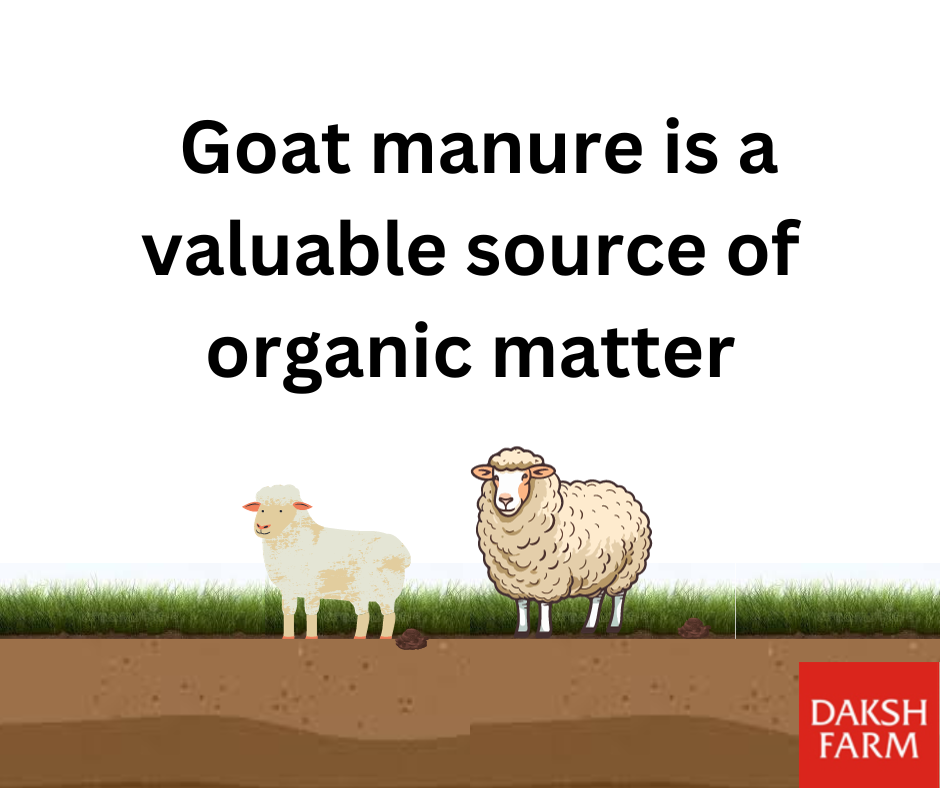
Introduction:
In organic farming, goat manure is highly prized for its potential as an excellent organic fertilizer. When managed adeptly, goat manure can provide numerous benefits to both soil and crops. Here’s how goat manure contributes to soil fertility and the well-being of crops in organic agriculture
Abundant in Nutrients:
Firstly, goat manure is rich in essential elements. Notably, it contains nitrogen (N), phosphorus (P), potassium (K), calcium (Ca), and magnesium (Mg). These nutrients are fundamental for plant growth and development.
Enhancing Organic Matter:
Moreover, goat manure serves as a precious source of organic matter. This addition improves soil structure, bolstering moisture retention, and fostering a thriving community of beneficial microorganisms. Consequently, this soil health ensures optimal nutrient supply to plants.
Promoting Microbial Vitality:
Furthermore, the organic matter within goat manure becomes a delectable feast for beneficial soil microorganisms. These microbes diligently break down organic matter, liberating nutrients in forms readily accessible to plants. This microbial synergy significantly enhances nutrient availability for crops.
pH Regulation:
Equally important, goat manure exhibits a near-neutral pH, effectively buffering soil pH levels. Maintaining proper pH levels is pivotal for efficient nutrient absorption by plants. Thus, goat manure plays a key role in preserving or adjusting soil pH within the optimal range for robust crop growth.
Combatting Soil Erosion:
Additionally, by fostering improved soil structure, goat manure application curtails soil erosion risks. Effective soil erosion control is essential for sustaining soil fertility and curbing environmental degradation.
Sustainable Fertilization:
Moreover, goat manure stands as a sustainable and renewable resource. With prudent management, it curtails the reliance on synthetic fertilizers that can inflict environmental harm. In line with organic farming principles, it prioritizes the use of natural and sustainable inputs.
Reduced Chemical Dependency:
Lastly, organic farming standards typically frown upon or prohibit the use of synthetic chemicals. Goat manure offers a natural, chemical-free alternative to synthetic fertilizers, aligning seamlessly with organic tenets.
Best Practices for Goat Manure Use:
To maximize the benefits of goat manure as an organic fertilizer, adherence to best practices is paramount:
Composting:
First and foremost, the composting of goat manure prior to application not only stabilizes nutrients but also mitigates odors, eliminates pathogens, and eradicates weed seeds. Consequently, properly composted goat manure emerges as a well-balanced fertilizer, less likely to induce nutrient imbalances or scorch plants.
Timely Application:
Furthermore, timely application of goat manure, well before planting, allows nutrients to break down and meld with the soil.
Avoiding Overuse:
While goat manure is a prized resource, it should be employed judiciously. Excessive application may engender nutrient imbalances, particularly with respect to phosphorus and potassium.
Soil Assessment:
Lastly, regular soil testing is indispensable for monitoring soil nutrient levels. This practice ensures that goat manure application aligns harmoniously with the specific nutrient requirements of crops.
By conscientiously integrating goat manure into organic farming practices and employing these best practices, farmers can nurture soil fertility, foster flourishing crop growth, and diminish the environmental footprint associated with conventional chemical fertilizers

13 Replies on Enhancing Soil Fertility in Organic Farming